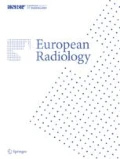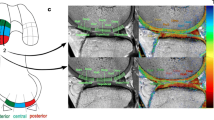Abstract
The objective of this study was to use advanced MR techniques to evaluate and compare cartilage repair tissue after matrix-associated autologous chondrocyte transplantation (MACT) in the patella and medial femoral condyle (MFC). Thirty-four patients treated with MACT underwent 3-T MRI of the knee. Patients were treated on either patella (n = 17) or MFC (n = 17) cartilage and were matched by age and postoperative interval. For morphological evaluation, the MR observation of cartilage repair tissue (MOCART) score was used, with a 3D-True-FISP sequence. For biochemical assessment, T2 mapping was prepared by using a multiecho spin-echo approach with particular attention to the cartilage zonal structure. Statistical evaluation was done by analyses of variance. The MOCART score showed no significant differences between the patella and MFC (p ≥ 0.05). With regard to biochemical T2 relaxation, higher T2 values were found throughout the MFC (p < 0.05). The zonal increase in T2 values from deep to superficial was significant for control cartilage (p < 0.001) and cartilage repair tissue (p < 0.05), with an earlier onset in the repair tissue of the patella. The assessment of cartilage repair tissue of the patella and MFC afforded comparable morphological results, whereas biochemical T2 values showed differences, possibly due to dissimilar biomechanical loading conditions.





Similar content being viewed by others
References
Hjelle K, Solheim E, Strand T, Muri R, Brittberg M (2002) Articular cartilage defects in 1,000 knee arthroscopies. Arthroscopy 18:730–734
Cohen ZA, Mow VC, Henry JH, Levine WN, Ateshian GA (2003) Templates of the cartilage layers of the patellofemoral joint and their use in the assessment of osteoarthritic cartilage damage. Osteoarthritis Cartilage 11:569–579
Eckstein F, Winzheimer M, Westhoff J et al (1998) Quantitative relationships of normal cartilage volumes of the human knee joint–assessment by magnetic resonance imaging. Anat Embryol (Berl) 197:383–390
Clark AL, Barclay LD, Matyas JR, Herzog W (2003) In situ chondrocyte deformation with physiological compression of the feline patellofemoral joint. J Biomech 36:553–568
Kurkijarvi JE, Nissi MJ, Kiviranta I, Jurvelin JS, Nieminen MT (2004) Delayed gadolinium-enhanced MRI of cartilage (dGEMRIC) and T2 characteristics of human knee articular cartilage: topographical variation and relationships to mechanical properties. Magn Reson Med 52:41–46
Lyyra T, Kiviranta I, Vaatainen U, Helminen HJ, Jurvelin JS (1999) In vivo characterization of indentation stiffness of articular cartilage in the normal human knee. J Biomed Mater Res 48:482–487
Alparslan L, Winalski CS, Boutin RD, Minas T (2001) Postoperative magnetic resonance imaging of articular cartilage repair. Semin Musculoskelet Radiol 5:345–363
Brittberg M, Winalski CS (2003) Evaluation of cartilage injuries and repair. J Bone Joint Surg Am 85(A Suppl 2):58–69
Recht M, White LM, Winalski CS, Miniaci A, Minas T, Parker RD (2003) MR imaging of cartilage repair procedures. Skeletal Radiol 32:185–200
Trattnig S, Millington SA, Szomolanyi P, Marlovits S (2007) MR imaging of osteochondral grafts and autologous chondrocyte implantation. Eur Radiol 17:103–118
Marlovits S, Singer P, Zeller P, Mandl I, Haller J, Trattnig S (2006) Magnetic resonance observation of cartilage repair tissue (MOCART) for the evaluation of autologous chondrocyte transplantation: determination of interobserver variability and correlation to clinical outcome after 2 years. Eur J Radiol 57:16–23
Burstein D, Velyvis J, Scott KT et al (2001) Protocol issues for delayed Gd(DTPA)(2−)-enhanced MRI: (dGEMRIC) for clinical evaluation of articular cartilage. Magn Res Med 45:36–41
Lammentausta E, Kiviranta P, Nissi MJ et al (2006) T2 relaxation time and delayed gadolinium-enhanced MRI of cartilage (dGEMRIC) of human patellar cartilage at 1.5 T and 9.4 T: Relationships with tissue mechanical properties. J Orthop Res 24:366–374
Mosher TJ, Dardzinski BJ (2004) Cartilage MRI T2 relaxation time mapping: overview and applications. Semin Musculoskelet Radiol 8:355–368
Smith HE, Mosher TJ, Dardzinski BJ et al (2001) Spatial variation in cartilage T2 of the knee. J Magn Reson Imaging 14:50–55
Goodwin DW, Wadghiri YZ, Dunn JF (1998) Micro-imaging of articular cartilage: T2, proton density, and the magic angle effect. Acad Radiol 5:790–798
Goodwin DW, Zhu H, Dunn JF (2000) In vitro MR imaging of hyaline cartilage: correlation with scanning electron microscopy. AJR Am J Roentgenol 174:405–409
Rubenstein JD, Kim JK, Morova-Protzner I, Stanchev PL, Henkelman RM (1993) Effects of collagen orientation on MR imaging characteristics of bovine articular cartilage. Radiology 188:219–226
Watrin-Pinzano A, Ruaud JP, Cheli Y et al (2004) Evaluation of cartilage repair tissue after biomaterial implantation in rat patella by using T2 mapping. Magn Reson Mater Phy 17:219–228
White LM, Sussman MS, Hurtig M, Probyn L, Tomlinson G, Kandel R (2006) Cartilage T2 assessment: differentiation of normal hyaline cartilage and reparative tissue after arthroscopic cartilage repair in equine subjects. Radiology 241:407–414
Welsch GH, Mamisch TC, Domayer SE et al (2008) Cartilage T2 assessment at 3-T MR imaging: in vivo differentiation of normal hyaline cartilage from reparative tissue after two cartilage repair procedures–initial experience. Radiology 247:154–161
Hangody L, Vasarhelyi G, Hangody LR et al (2008) Autologous osteochondral grafting—technique and long-term results. Injury 39(Suppl 1):S32–39
Buckwalter JA, Martin JA, Olmstead M, Athanasiou KA, Rosenwasser MP, Mow VC (2003) Osteochondral repair of primate knee femoral and patellar articular surfaces: implications for preventing post-traumatic osteoarthritis. Iowa Orthop J 23:66–74
Duc SR, Pfirrmann CW, Koch PP, Zanetti M, Hodler J (2008) Internal knee derangement assessed with 3-minute three-dimensional isovoxel true FISP MR sequence: preliminary study. Radiology 246:526–535
Marlovits S, Striessnig G, Resinger CT et al (2004) Definition of pertinent parameters for the evaluation of articular cartilage repair tissue with high-resolution magnetic resonance imaging. Eur J Radiol 52:310–319
Duc SR, Koch P, Schmid MR, Horger W, Hodler J, Pfirrmann CW (2007) Diagnosis of articular cartilage abnormalities of the knee: prospective clinical evaluation of a 3D water-excitation true FISP sequence. Radiology 243:475–482
Duc SR, Pfirrmann CW, Schmid MR et al (2007) Articular cartilage defects detected with 3D water-excitation true FISP: prospective comparison with sequences commonly used for knee imaging. Radiology 245:216–223
Marlovits S, Zeller P, Singer P, Resinger C, Vecsei V (2006) Cartilage repair: generations of autologous chondrocyte transplantation. Eur J Radiol 57:24–31
Brittberg M, Lindahl A, Nilsson A, Ohlsson C, Isaksson O, Peterson L (1994) Treatment of deep cartilage defects in the knee with autologous chondrocyte transplantation. New Engl J Med 331:889–895
Kiviranta P, Rieppo J, Korhonen RK, Julkunen P, Toyras J, Jurvelin JS (2006) Collagen network primarily controls Poisson’s ratio of bovine articular cartilage in compression. J Orthop Res 24:690–699
Ahmed AM, Burke DL (1983) In-vitro measurement of static pressure distribution in synovial joints—part I: tibial surface of the knee. J Biomech Eng 105:216–225
Ahmed AM, Burke DL, Yu A (1983) In-vitro measurement of static pressure distribution in synovial joints—part II: retropatellar surface. J Biomech Eng 105:226–236
Athanasiou KA, Rosenwasser MP, Buckwalter JA, Malinin TI, Mow VC (1991) Interspecies comparisons of in situ intrinsic mechanical properties of distal femoral cartilage. J Orthop Res 9:330–340
Behrens P, Bitter T, Kurz B, Russlies M (2006) Matrix-associated autologous chondrocyte transplantation/implantation (MACT/MACI)—5-year follow-up. Knee 13:194–202
Dardzinski BJ, Laor T, Schmithorst VJ, Klosterman L, Graham TB (2002) Mapping T2 relaxation time in the pediatric knee: feasibility with a clinical 1.5-T MR imaging system. Radiology 225:233–239
Mosher TJ, Collins CM, Smith HE et al (2004) Effect of gender on in vivo cartilage magnetic resonance imaging T2 mapping. J Magn Reson Imaging 19:323–328
Gomez S, Toffanin R, Bernstorff S et al (2000) Collagen fibrils are differently organized in weight-bearing and not-weight-bearing regions of pig articular cartilage. J Exp Zool 287:346–352
Xia Y (2000) Heterogeneity of cartilage laminae in MR imaging. J Magn Reson Imaging 11:686–693
Xia Y (2000) Magic-angle effect in magnetic resonance imaging of articular cartilage—a review. Invest Radiol 35:602–621
Hambly K, Bobic V, Wondrasch B, Van Assche D, Marlovits S (2006) Autologous chondrocyte implantation postoperative care and rehabilitation: science and practice. Am J Sports Med 34:1020–1038
Author information
Authors and Affiliations
Corresponding author
Rights and permissions
About this article
Cite this article
Welsch, G.H., Mamisch, T.C., Quirbach, S. et al. Evaluation and comparison of cartilage repair tissue of the patella and medial femoral condyle by using morphological MRI and biochemical zonal T2 mapping. Eur Radiol 19, 1253–1262 (2009). https://doi.org/10.1007/s00330-008-1249-6
Received:
Revised:
Accepted:
Published:
Issue Date:
DOI: https://doi.org/10.1007/s00330-008-1249-6




